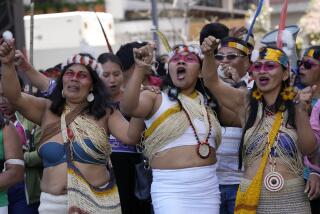Ecuador effort to protect nature reserve in peril
- Share via
Reporting from Quito, Ecuador — Ecuador is trying to salvage its campaign to enlist international sponsors to protect a pristine nature reserve in the Amazon, after an initial drive ended in disarray and doubts about whether President Rafael Correa would leave the park’s oil riches untouched.
Correa recently appointed former Foreign Minister Maria Fernanda Espinosa to head a new panel to seek donations from Arab and Asian countries for the 2.4-million-acre Yasuni National Park, one of the world’s most biodiverse nature reserves.
Members of a previous panel of environmentalists, as well as Foreign Minister Fander Falconi, resigned last month after Correa publicly berated the Yasuni proposal they had spent two years developing, calling them “infantile environmentalists.” The panel had completed a draft proposal and secured tentative commitments from the governments of Spain, Germany, Belgium and Sweden to contribute $1.7 billion -- about half the amount demanded by Correa.
“The president has declared his commitment to continue with the Yasuni initiative,” Espinosa told reporters last month. “He has asked me to coordinate, supervise and organize the work, but who is really behind this big dream is the president himself.”
Ecuador’s plan to preserve Yasuni won international plaudits when it was unveiled in 2007. Foreign governments concerned about global warming and pollution would in effect pay Ecuador to leave 870 million barrels of Yasuni oil in the ground, 20% of the country’s known reserves.
The goal was to save Yasuni’s rain forest from the ravages of oil development that has stained other parts of Ecuador, particularly around Lago Agrio. Oil spills there have created health issues, including high cancer rates, and blighted the environment, according to a $27-billion lawsuit filed against Chevron by Ecuadorean environmentalists.
Chevron denies that it is at fault. The company in 2001 acquired Texaco, which explored for and extracted oil in Lago Agrio beginning in 1964 in partnership with Ecuador’s state oil company, Petroecuador.
The draft proposal by the previous panel, headed by former Quito Mayor Roque Sevilla, called for the money to go into a trust fund administered by the United Nations Development Program. The interest from the fund was to have paid for reforestation, social aid to indigenous communities and clean-energy projects. The principal would remain untouched -- unless Ecuador exploited Yasuni’s oil, in which case it was to be returned to donors.
Many environmentalists mourned the collapse of the deal that would have preserved a rain forest of uniquely concentrated biodiversity at the meeting place of the Amazon, the Andes mountains and the equator.
The United Nations in 1989 declared the park a “world biosphere reserve” for its unique “bank” of wildlife and plants. Yasuni is also home to several indigenous communities, including the Huaorani, that live in voluntary isolation.
“In one hectare you have more species of trees and shrubs than in Canada and the U.S. combined,” said Quito biologist and Yasuni expert David Romo Vallejo, a professor at the University of San Francisco of Quito. “Yasuni has 630 species of birds, or 44% of what’s in the Amazon basin, and 130 amphibian, 80 bat and 90 reptile species.”
Members of Sevilla’s team pursuing the trust fund concept had hoped to unveil it at December’s Copenhagen climate-change summit, thinking they had Correa’s support. But presidential advisor Alexis Mera cautioned them to wait, citing legal problems.
In early January, Correa issued harsh criticism of the panel, prompting the resignation of member and former Environment Minister Yolanda Kakabadse, who in May was named the president of World Wildlife Fund. She was not available for comment.
During one of his regular Saturday television programs, Correa said last month that he wanted a plan that would preserve the environment but allow for responsible exploitation of Yasuni oil reserves.
He also said that a trust fund managed by the U.N. would be a violation of Ecuadorean sovereignty. “We aren’t going to let donors set shameful conditions,” Correa told his television audience.
Some observers are pessimistic that foreign sponsors who were once ready to commit to the trust fund concept will be willing to let the Ecuadorean government, with its history of instability and fiscal mismanagement, control billions of their donated dollars.
Nor, observers say, will contributors want to pay for a reserve that in effect won’t be one if Correa decides to drill for Yasuni’s oil.
Kraul is a special correspondent.
More to Read
Sign up for Essential California
The most important California stories and recommendations in your inbox every morning.
You may occasionally receive promotional content from the Los Angeles Times.










